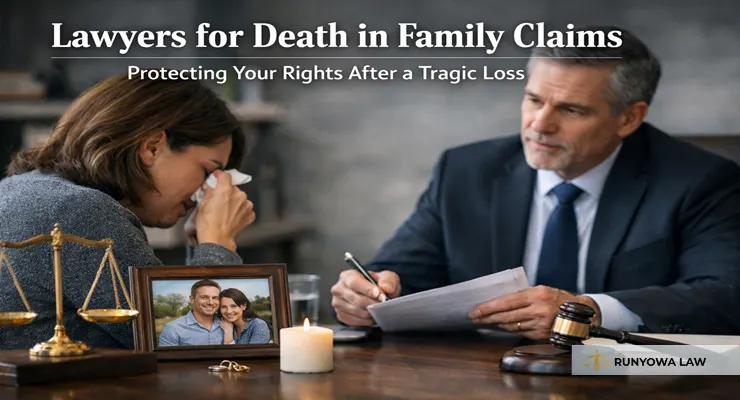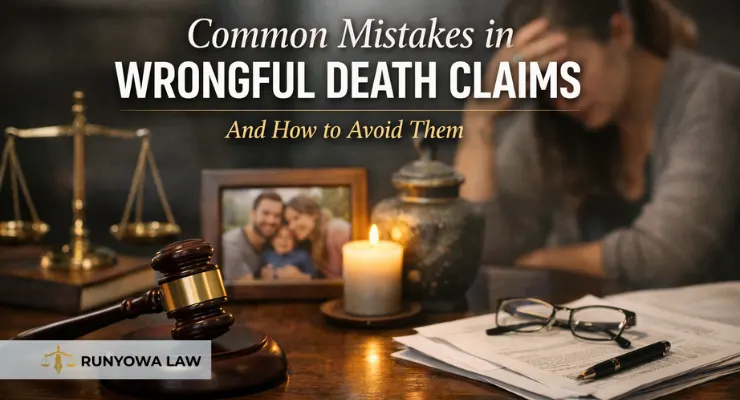Losing a loved one is devastating — especially when the death was caused by someone else’s negligence, recklessness, or misconduct. Beyond the emotional pain, families often face overwhelming financial and legal challenges. In such cases, a wrongful death claim offers a legal pathway to seek justice and recover compensation for the losses endured.
But what exactly can you recover in a wrongful death case? Understanding the types of damages available — and how courts determine compensation — is crucial for families seeking closure and financial security.
This guide explains the different types of compensation in wrongful death cases, who can file a claim, and what factors influence the final settlement or verdict.
What Is a Wrongful Death Claim?
A wrongful death claim is a civil lawsuit brought when a person’s death results from another party’s negligence, recklessness, or intentional act. It allows surviving family members or representatives of the deceased’s estate to pursue financial damages against the responsible party.
Common causes of wrongful death include:
- Car, truck, or motorcycle accidents
- Medical malpractice
- Workplace accidents
- Defective products
- Nursing home neglect
- Criminal acts or violence
Unlike criminal cases (which focus on punishment), wrongful death claims aim to provide financial compensation and accountability for the harm caused.
Who Can File a Wrongful Death Claim?
The rules about who can file a wrongful death lawsuit vary by jurisdiction, but typically include:
- The spouse or domestic partner of the deceased
- Children or dependents
- Parents (if the deceased had no spouse or children)
- In some cases, the executor or representative of the deceased’s estate
Each eligible party may be entitled to a portion of the settlement or judgment, depending on local laws and the specific circumstances of the case.
Types of Compensation in Wrongful Death Cases
Wrongful death compensation usually falls into two main categories: economic damages and non-economic damages. In certain cases, punitive damages may also apply. Let’s explore each in detail.
1. Economic Damages: Tangible Financial Losses
Economic damages cover the measurable financial impact caused by the death. These are quantifiable losses that can be proven through receipts, records, and expert testimony.
Common examples include:
a. Medical Expenses Before Death
If the deceased received medical care before passing away (such as emergency treatment or hospitalization), those expenses can be recovered.
b. Funeral and Burial Costs
Families are entitled to reimbursement for reasonable funeral, burial, or cremation expenses.
c. Lost Income and Benefits
This includes not only the income the deceased would have earned if they had lived but also future earnings, retirement benefits, and pension contributions lost due to the wrongful death.
d. Loss of Household Services
If the deceased provided household support — childcare, maintenance, or elder care — the value of these services can also be included in the claim.
Economic damages provide a foundation for the financial recovery, ensuring that families can maintain stability despite their loss.
2. Non-Economic Damages: Emotional and Intangible Losses
While money cannot replace a loved one, non-economic damages compensate for emotional suffering and loss of companionship. These damages recognize the human and relational side of the loss.
Common non-economic damages include:
a. Pain and Suffering of Survivors
Surviving family members often experience immense emotional distress, depression, and loss of enjoyment of life. Courts may award compensation for this suffering.
b. Loss of Companionship and Consortium
Spouses can recover for the loss of love, support, and intimacy they shared with the deceased. Similarly, children can receive compensation for the loss of parental guidance and care.
c. Mental Anguish
Emotional trauma resulting from witnessing the death or dealing with its aftermath can also be factored into the compensation.
Non-economic damages are harder to quantify, but they play a vital role in helping families rebuild emotionally and psychologically after a devastating loss.
3. Punitive Damages: Holding Wrongdoers Accountable
In some wrongful death cases — particularly those involving gross negligence, reckless behavior, or intentional harm — courts may award punitive damages.
These are not meant to compensate the family directly but to punish the wrongdoer and deter similar misconduct in the future.
Examples where punitive damages may apply include:
- Drunk driving accidents resulting in death
- Fatal medical errors caused by willful neglect
- Defective products knowingly sold without safety warnings
Not all jurisdictions allow punitive damages in wrongful death cases, but when available, they can significantly increase the overall compensation amount.
How Courts Calculate Wrongful Death Compensation
The value of a wrongful death claim depends on several factors, including:
- The age, health, and life expectancy of the deceased
- Their earning capacity and career potential
- The degree of dependency of the surviving family members
- The circumstances of the wrongful act (negligence vs. intent)
- Medical and funeral expenses
- The jurisdiction’s laws and damage caps
Lawyers often work with economic experts to estimate future earnings, medical professionals to establish the extent of injuries, and psychologists to demonstrate emotional harm.
Because of these complexities, having an experienced wrongful death attorney is essential to ensure the claim accurately reflects both financial and emotional losses.
Why Legal Representation Matters
Wrongful death cases are among the most challenging types of civil claims. Insurance companies and defendants often try to minimize payouts or shift blame to avoid liability.
A skilled lawyer can help by:
- Investigating the cause of death and gathering evidence
- Calculating full economic and non-economic damages
- Negotiating with insurers or opposing counsel
- Representing your case in court, if necessary
An attorney ensures your claim is filed correctly, within the statute of limitations, and backed by compelling evidence.
Conclusion
No amount of money can ever replace a lost life. However, compensation in a wrongful death case provides families with financial relief, accountability, and a sense of justice. It covers both tangible losses — like medical bills and lost income — and the emotional suffering that no family should have to endure.
If you’ve lost a loved one due to someone else’s negligence, consult a wrongful death lawyer as soon as possible. They can explain your rights, assess your case, and help you recover the compensation your family deserves.
Because in times of unimaginable loss, justice and financial security can help you take the first step toward healing.




